Mastering Strategy in Blackjack: A Comprehensive Guide
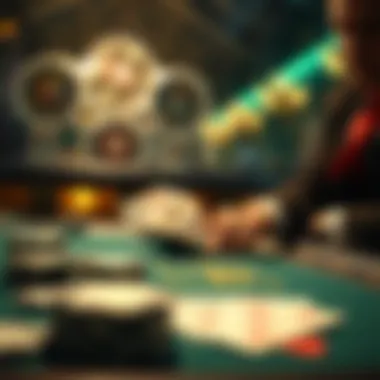
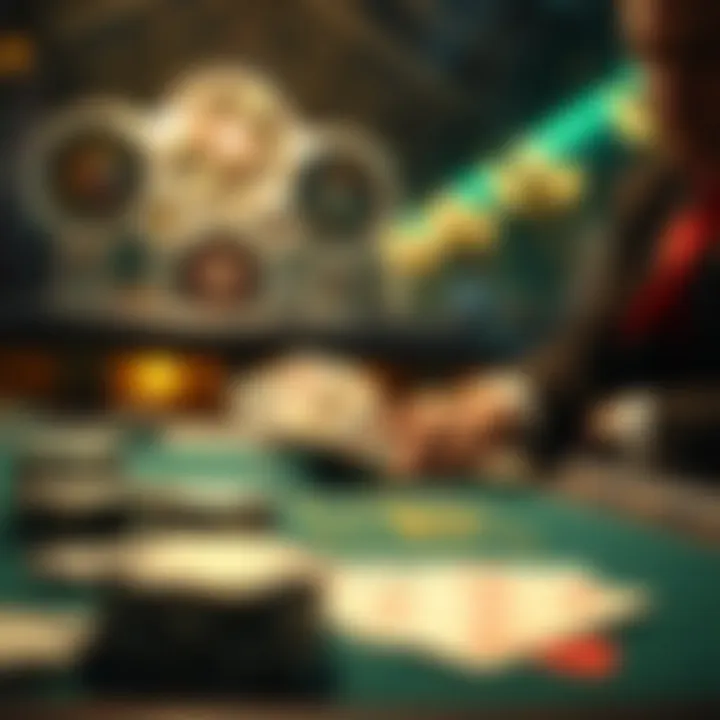
Intro
When one steps into a casino, the vibrant chatter and ringing slot machines can elevate one's excitement. However, beyond the dazzling allure of lights and sounds lies a game steeped in skill and strategy: blackjack. While luck may cast the first die, true mastery of blackjack reveals itself in the understanding of strategy, which is a delicate interplay of math and psychology. This exploration aims to dissect the game's foundational and advanced tactics, enabling players to engage with greater confidence.
Blackjack is not merely a game of chance; it’s a battleground of wits where two players—one human, the other the house—face off against each other. Knowing the “why” and “how” behind decisions is often the difference between triumph and defeat. Here, we will drape the strategies over a few significant pillars:
- Betting Strategies: Understanding how to wager wisely sets the stage for victory.
- Psychological Aspects: The ways in which one can invoke or counteract psychological tactics.
- Tactical Plays: Specific methodologies to increase one's odds against the house.
Through this guide, whether you are a novice hopeful of mastering the basics or a seasoned player seeking to refine intricate methodologies, there’s something here for every type of blackjack aficionado. Let’s get our hands dirty with the science behind strategy—because in blackjack, precision and prudence reign supreme.
Understanding Blackjack Fundamentals
The world of blackjack is more than just cards and chips; it’s a strategic battlefield where understanding the fundamentals can make the difference between success and disappointment. The importance of mastering the foundational elements of blackjack cannot be overstated. Whether you’re a novice taking your first steps or a seasoned player fine-tuning your approach, grasping the basic concepts lays the groundwork for more advanced strategies and tactics.
In this section, we’ll explore key elements such as the rules of the game, its objectives, and the house edge. Each of these components is crucial for developing a comprehensive understanding of how to not only play blackjack but to play it effectively.
The Basic Rules of Blackjack
Blackjack operates on a simple set of rules that govern how players interact with the dealer and the cards. Generally, the objective is to beat the dealer by achieving a hand value closer to 21 without exceeding it. The game typically uses one or more decks of standard playing cards, where an Ace can count as either 1 or 11, cards from 2-10 hold their face values, and face cards (Kings, Queens, Jacks) count as 10.
Here’s a brief overview of the fundamental rules:
- Each player receives two cards, and the dealer has one card face up and one hidden.
- Players have multiple options: hit (take another card), stand (keep current hand), double down (double the bet and take a single card), or split (divide cards into two hands if they’re the same).
- The dealer must hit until their hand totals 17 or higher. Some casinos enforce a rule requiring the dealer to hit on a 'soft 17' (an Ace and a 6).
Understanding these rules is essential as they dictate your strategic options during the game, and this knowledge often separates the casual player from the serious contender.
The Objective of the Game
The objective of blackjack is straightforward yet layered. You aim to accumulate a hand value of 21 or as close to it as possible without going over. Players compete against the dealer rather than each other, which introduces an element of psychology and strategy—understanding whether to take risks based on what the dealer is showing.
Additionally, the payout structure adds to the strategic complexity. For example, hitting a blackjack (an Ace with a 10-value card) typically pays 3:2, meaning a $10 bet would win $15. Knowing when to increase your bets based on the dealer's face-up card can pivot your playing strategy.
House Edge Explained
Every casino game has a house edge, and blackjack is no different. The house edge is the mathematical advantage that the casino holds over the players, represented as a percentage. In blackjack, this edge usually hovers around 0.5% to 1% when players stick to the basic strategy. This means that for every $100 wagered, the casino expects to make 50 cents to one dollar in profit over time.
Factors impacting the house edge include:
- The number of decks used in the game: Generally, fewer decks mean a lower house edge.
- Specific rules, such as whether the dealer hits or stands on a soft 17, and the payout rates for blackjack.
- Player decisions and strategies.
Understanding the house edge is critical as it shapes your overall approach. A well-informed player can make decisions that not only minimize losses but also exploit the nuances of the game for better outcomes.
Core Blackjack Strategies
Understanding the core strategies in blackjack is not just beneficial; it’s essential for any player who aims to move beyond the randomness of chance and into the realm of skillful play. Every hand dealt presents a new situation where critical thinking and strategy intersect. By employing solid strategies, players can significantly reduce the house edge and improve their chances of winning. This part of the article will outline fundamental strategies that every blackjack player should become familiar with, making it easier for them to interact with the game on a deeper level.
The Basic Strategy Table
At the heart of blackjack strategy lies the Basic Strategy Table. This handy tool serves as a guide for players, offering optimal actions based on the player’s hand and the dealer’s upcard. Understanding this table is akin to learning the ropes before diving headfirst into the ocean. The Basic Strategy Table tells players when to hit, stand, double down, or split.
- Hit: You take another card, aiming to get closer to 21 without exceeding it.
- Stand: You keep your hand as it is, believing it to be strong enough against the dealer.
- Double Down: You double your bet and take only one more card.
- Split: You divide two cards of the same value into two separate hands.
Familiarity with this table can feel like having a secret weapon. However, it’s not just about memorizing the table. Your understanding of its underlying principles can turn the tables in your favor. Most strategies derived from the Basic Strategy Table rely on probabilities. By stressing the importance of mathematical reasoning, players will find themselves equipped to make decisions that can cushion any impending losses.
Hit, Stand, Double Down, and Split
When you're seated at a blackjack table and the dealer’s cards are laid out, one must assess their own cards before making a decision. The actions of hit, stand, double down, or split become pivotal here. Knowing when to make each of these moves is what separates novice players from seasoned gamblers.
- Hiting is usually your best option when your total is low, especially below 12 when the dealer shows a high card like a ten or an ace.
- Standing becomes desirable when you have a strong total—like 17 or higher—and you don’t want to risk going over 21.
- Doubling Down can be very effective, particularly when your first two cards total 11. This method effectively takes advantage of situations where the dealer is likely weak.
- Splitting pairs can be advantageous, especially in cases like aces and eights. However, learning when to split is just as crucial. For instance, splitting tens is typically discouraged because you already have a strong hand.
By understanding these decisions, you’re not just playing cards; you are leveraging mathematical odds to steer the game in your favor.
Soft and Hard Hands
When you grasp the concepts of soft and hard hands, you set yourself up for smarter gameplay. In blackjack, a hard hand is one that doesn’t contain an ace or has an ace counted as 1. For example, a hand totaling 10 and 6 is a hard hand because that ace is not present to soften the blow. Conversely, a soft hand contains an ace counted as 11, which allows for more flexibility. If you have an ace and a seven, you can still hit without the risk of busting.
Understanding the difference is like knowing how to navigate different terrains: you adapt based on conditions. Here’s how they break down:
- Hard hands: You’ll want to be cautious about hitting, especially if your total is over 16.
- Soft hands: Since you can hit without busting, you have more leeway in your decisions.
In practical terms, if you hold a soft 17 (ace and six), many players will hit, hoping for another card that brings them closer to that golden 21. The essence of successful blackjack playing lies in adapting to the nuances of soft and hard hands, ensuring that your strategy is always in sync with the possible outcomes.
"In blackjack, knowledge is not just power; it’s your armor against the unpredictability of chance."
By mastering these core strategies, players can navigate the complexities of blackjack with greater confidence and poise. These foundational strategies serve as stepping stones towards becoming a more adept player, whether playing casually or in a high-stakes environment.
Advancing Your Game through Card Counting


Understanding the nuances of card counting can significantly elevate one’s strategy in blackjack. At its core, card counting is a technique that allows players to gauge the remaining high and low cards in the deck, essentially shifting the odds in their favor. This isn’t about magic tricks or sleight of hand; it's about mathematical precision and keen observation. By mastering card counting, players can make more informed decisions— each choice becoming a calculated risk rather than a shot in the dark.
The Concept of Card Counting
Card counting revolves around a simple principle: keep track of the ratio of high cards to low cards that remain in the deck. When the deck is rich in high cards, the players have a better chance of hitting twenty-one. Conversely, when low cards prevail, the house typically has the upper hand. The essence is to assign values to the cards:
- Low cards (2-6) are assigned a value of +1.
- Neutral cards (7-9) are marked with 0.
- High cards (10-Ace) get a value of -1.
This system helps the player maintain a running count, which they can convert into a true count based on the number of decks in play. This helps gauge when to increase bets and when to play it safe. It can't be emphasized enough that card counting isn't illegal, but casinos frown upon it, so discreet practice and application are vital.
Popular Card Counting Systems
When it comes to card counting, a few systems have garnered widespread attention for their effectiveness and relative ease of use. Three notable systems include the Hi-Lo System, the KO System, and the Omega II System. Each of these has its own individual traits, but they all serve the same purpose: enhancing players' odds at the blackjack table.
Hi-Lo System
The Hi-Lo System is perhaps the most popular among players due to its simplicity and effectiveness. It provides a straightforward way to keep track of cards, and its contribution to card counting lies in the balance it strikes between accuracy and ease of learning. A key characteristic of the Hi-Lo is its straightforward scoring system which allows a player to quickly evaluate remaining cards.
One unique feature of the Hi-Lo System is its flexibility; it can be used with varying deck sizes despite generally being more effective with single or double decks. However, it requires a certain level of discipline. Tracking constantly and adjusting your bets based on the true count can be challenging, especially in the heat of the moment.
KO System
The KO System, or Knock-Out System, is a non-weighted technique that simplifies the counting process even further. A major draw for players is that it doesn’t require conversion from running count to true count, which saves time and mental effort. The key characteristic of the KO System is its unique approach to establishing the count without the need for dividing the running count by the number of decks remaining in the shoe.
This attribute makes it highly accessible for new players or those who might find the more complex systems daunting. However, as with any strategy, it has its disadvantages; while information can be quickly assimilated, it might not provide the same depth of insight into the game dynamics as weighted systems do.
Omega System
The Omega II System is more sophisticated and involves a more complex counting system that assigns varied values to cards: +1, +2, and -2. This system stands out for its accuracy because it provides a more detailed count of high and low cards, which can be advantageous in your decision-making process. A principal characteristic of this method is that it accounts for the varied threshold of impact each card has on the game.
While it is beneficial for those looking to delve deeper into the mechanics of blackjack, its complexity can be overwhelming for casual players. The unique features of the Omega II System—namely, its accuracy—can outweigh its disadvantages provided the player is willing to invest the time to master it.
Implementing Card Counting Strategies
Applying card counting strategies effectively requires a solid understanding of both the techniques and the game dynamics. To truly master card counting, one must practice extensively, ideally in an environment where distractions are minimal. Start by honing the basic count at home, perhaps during practice games with friends or using online simulations. The true mastery comes from integrating the counting technique live at the table where timing, bet adjustments, and emotional control all come into play. It’s about adjusting your strategy on-the-fly—an act that blends math skillfully with instinct and psychological finesse.
The Role of Game Psychology
When it comes to blackjack, having the right strategies can set the stage for success, but a player's mindset often shapes the outcome even more profoundly. Understanding the psychological factors at play is crucial. It transcends the mechanics of gameplay, taking root in how individuals think and react under pressure. Whether one is a seasoned gambler or a novice at the table, game psychology offers insights that can't be ignored.
Understanding Player Psychology
At the heart of game psychology is the concept of player psychology. This is how a player’s thought processes, emotions, and behaviors affect their actions and decisions at the table. Each player comes with a unique set of beliefs and attitudes toward risk and reward.
For instance, a person who consistently views losses through a negative lens may act impulsively to recover their losses. This behavior can lead to making poor decisions, like doubling bets after losses, which is built more on emotion than strategy. Meanwhile, someone who maintains a calm demeanor and trusts in the basic principles of blackjack will likely make more rational choices.
Recognizing one’s psychological tendencies is key—be it overconfidence or a lack of confidence. Keeping emotions in check can be a real game-changer, allowing one to focus on strategy rather than being driven by feelings.
Dealing with Losses and Emotions
Losses are an inevitable part of blackjack. However, how one deals with them can either bolster or shatter one's gaming approach. It's human to feel frustration or disappointment after a string of losses; the important part is management of these emotions.
"Emotional discipline is the true cornerstone of any successful gambling strategy."
Practicing mindfulness before and during a game can help manage these feelings. Deep breathing, for example, can help ground a player before they make key decisions. Additionally, one must remind oneself of the broader picture—each hand is just a part of many. The strategy should revolve around long-term success rather than immediate gratification. Keeping a consistent mindset, regardless if one wins or loses, is a pertinent factor in blackjack.
Reading Opponents at the Table
Another crucial psychological aspect is the ability to read fellow players at the table. Noticing subtle cues can provide valuable insights into their strategies and emotional states. Some players might display nervous habits when they feel weak, while others might bluff with exaggerated confidence. Understanding these non-verbal signals can give a player a competitive edge.
Key behaviors to watch for include:
- Body Language: Slouched postures might indicate discomfort, while an upright stance can signal confidence.
- Betting Patterns: How a player bets can reveal their strategy. For instance, if someone who usually plays conservatively suddenly makes a large bet, it could indicate they’re either bluffing or feeling bold after a win.
- Facial Expressions: Subtle shifts in expression can betray a player’s true feelings. Even a fleeting glance toward their chips can hint at indecision or eagerness.
By honing the skill of reading the table, players can adapt their strategies effectively. Awareness of both their own psychology and that of opponents creates a balanced environment where tactical advantage thrives, enhancing the overall gaming experience.
Examining Betting Techniques
In the world of blackjack, the strategies employed extend far beyond merely knowing when to hit or stand. One of the significant elements that can shape the outcome of a player's experience at the table is the way they approach betting. Betting techniques not only influence your bankroll management but also affect key game dynamics such as risk assessment and psychological play. An understanding of various betting strategies can mean the difference between a fleeting visit to the casino and a sustained winning streak.
A thoughtful approach to betting allows players to leverage mathematical advantages and maintain an emotional equilibrium, which is crucial amid the game's inherent ups and downs. Moreover, employing the right betting technique can offset the house's edge, at least partially. Below, we delve into specific betting strategies that are often favored by seasoned players.
Spread Betting Strategies
Spread betting strategies involve varying the size of your bets in relation to your hand, game state, or overall bankroll. This technique is particularly useful in managing both risk and reward. For example, if you’re ahead in the game, increasing your bet when you have a strong hand can help maximize winnings. Conversely, betting smaller amounts during losing streaks can preserve your bankroll.
- Flat Betting: This is one of the simplest forms of spread betting, where players bet the same amount every round. While it may not capitalize on winning opportunities effectively, it can help limit losses.
- Variable Betting: This encompasses adjusting your bets based on the game's context. This can mean increasing bets on favorable hands or decreasing them during unfavorable ones, reacting dynamically to the game developments.
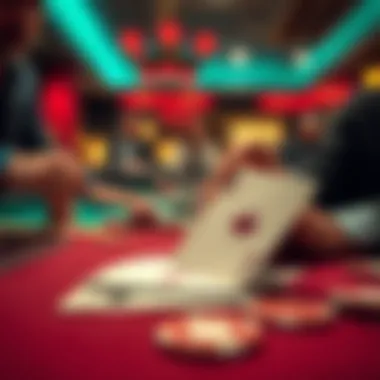
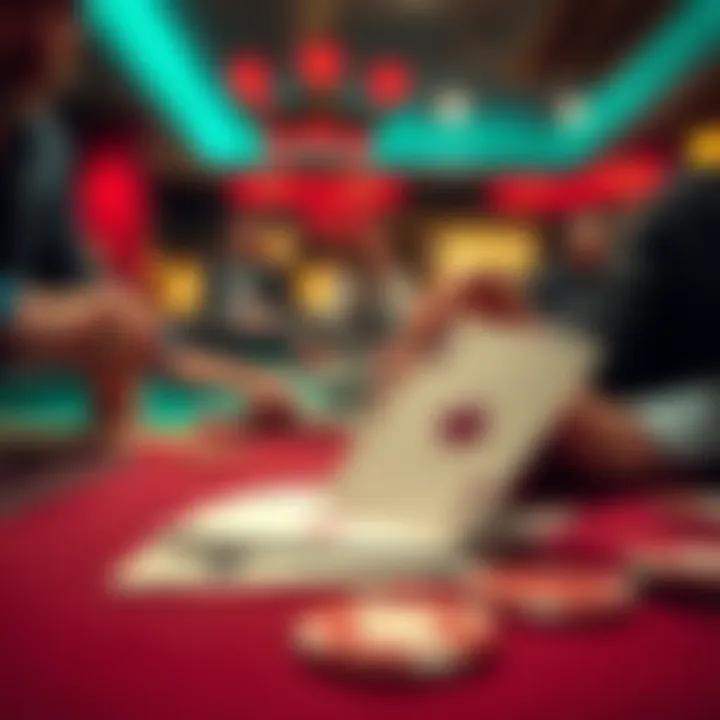
It’s critical, however, to note that a spread betting approach should not be confused with reckless gambling. Setting limits and staying disciplined are essential components of this betting philosophy.
Martingale System and Variants
The Martingale system is a well-known betting strategy that relies on the concept of doubling your bet after every loss. The idea is that, eventually, you will win a hand, and the victory will cover all previous losses, alongside a profit equal to your original bet. However, this system comes with significant risks.
- Pros:
- Cons:
- Simple to understand; very intuitive for newcomers.
- Offers the potential for quick recovery after losses.
- Requires a large bankroll, as losing streaks can lead to substantial bets that may exceed table limits or deplete funds quickly.
- The risk of hitting a long losing streak is always present.
Variations of the Martingale include the Grand Martingale (which adds an extra unit to your bet after a loss) and the Reverse Martingale, where you double your bet after a win, which aims to take advantage of winning streaks.
Progressive Betting and its Pitfalls
Progressive betting strategies come with a wide array of approaches, with the aim of capitalizing on wins while minimizing losses. This strategy often involves a pre-determined sequence where players increase their bets following wins or sometimes losses. The key here is to establish a betting progress that coincides with their performance. However, while this can seem attractive, it does carry its set of challenges.
- Types of Progressive Strategies:
- Positive Progressions: Increase your bet after wins.
- Negative Progressions: Increase your bet after losses.
While progressive systems might promise systematic gains, players should be wary. The biggest pitfall is the assumption that past outcomes will dictate future results. Case in point, just because you've won a few hands doesn’t guarantee that the next one will favor you as well. Hence, it is paramount for players to maintain a discerning understanding of their betting strategies to avoid blindly following a system that may not yield results.
Takeaway: Whether you favor spread betting techniques, the Martingale system, or progressive betting, each has its strengths and pitfalls. Balancing risk with strategic foresight can help you navigate the complexities of blackjack betting.
Exploring Variations of Blackjack
Within the realm of blackjack, variations play a significant role in enhancing the experience for players. Each variant boasts its own set of rules, strategies, and nuances that can profoundly affect gameplay and the overall approach to mastering the game. Understanding these differences isn't just for the sake of knowledge; it can bolster a player's ability to adapt to different gaming environments. Whether you're hitting the tables at a casino or playing online, knowing what to expect with various formats can maximize your chances of success.
Traditional vs. Modern Variants
Traditional variants of blackjack, such as Classic Blackjack, have stood the test of time, remaining popular due to their straightforward rules and familiar structure. These versions typically employ a single deck of cards and adhere closely to standard rules, which provide players with a more predictable and manageable strategy. In these games, harnessing the fundamentals is crucial. Players rely heavily on established strategies to navigate their way through the uncertainties of each hand.
Contrasting with this, modern variants like Blackjack Switch and Spanish 21 introduce innovative twists that can significantly alter gameplay. For instance, in Blackjack Switch, players can switch their second cards between two hands, presenting a unique opportunity to enhance their chances of winning. Each modern spin often comes with additional rules, side bets, and unique payout structures that require players to adjust their strategies accordingly, making adaptability an essential trait for those looking to master the game in its various forms.
European vs. American Blackjack
When comparing European and American Blackjack, the most noticeable differences lie in how the games are structured. In American Blackjack, the dealer receives two cards, one face-up and one face-down, which can lead to the dreaded 'dealer blackjack' earlier in the round. On the other hand, European Blackjack only gives the dealer one card face-up initially, adding an extra layer of suspense as players don't know whether the dealer will eventually go bust when they hit. This change in structure can influence betting strategies significantly, especially in deciding whether to risk a double down or split.
Furthermore, European rules often employ a different payout system for blackjack, providing a lower house edge in certain situations. Understanding these differences helps players tailor their strategies based on the variant they're playing.
Innovative Blackjack Games
The landscape of blackjack is continually evolving, with innovative games popping up regularly. These new formats often integrate unique rules and features designed to appeal to both novice and seasoned players. Games like Infinite Blackjack or Power Blackjack expand on traditional concepts by allowing more than one player at the table to interact with a common set of cards. This not only keeps the pace thrilling but also opens up new strategic possibilities.
Moreover, live dealer games have gained traction, blending online convenience with a social atmosphere. Players can engage with a real dealer via video stream while maintaining the comfort of their own home. This method retains essential aspects of gameplay and enables players to practice their strategies in a dynamic environment.
Utilizing Technology in Blackjack
In today’s fast-paced gambling world, technology plays a pivotal role in shaping the way players engage with blackjack. With advancements in online gaming platforms and the proliferation of mobile applications, players are discovering new ways to expand their skills and refine their strategies. This section delves into the various facets of technology that enhance the blackjack experience, highlighting important aspects like convenience, accessibility, and innovative tools that can provide a competitive edge.
Online Blackjack Platforms
The rise of online blackjack platforms has revolutionized how enthusiasts approach the game. Websites such as BetOnline and 888 Casino have made it possible for anyone with an internet connection to join in on the action right from the comfort of their home. These platforms are not just about convenience; they open up a world of opportunities to practice and play at any time, providing access to games that might not be available locally.
"The beauty of online blackjack is that it combines the thrill of gambling with the ease of technology."
Moreover, many of these sites employ sophisticated algorithms to enhance game fairness. Live dealer options allow players to experience the social aspect of blackjack without stepping into a physical casino. This blend of technology and traditional gameplay creates an immersive environment that can attract both novices and seasoned players alike.
The Impact of Mobile Gaming
Mobile gaming is another game changer in the blackjack arena, making it so that players have a deck of cards right at their fingertips. Popular applications like Jack888 and Blackjack 21 ensure that spinning the wheel or hitting a twenty-one can happen anytime, anywhere. These apps generally offer user-friendly interfaces that make gaming accessible without losing depth or strategy.
Due to constant portability, players can practice their strategies on the go. You can be waiting for a bus or sipping coffee at a café while perfecting your betting techniques. This flexibility encourages not just play, but also continuous improvement in skills.
Software Tools for Analysis
For those truly serious about mastering blackjack, software tools add another layer of learning. Programs like Blackjack Info or the Wizard of Odds provide simulation environments where players can analyze the outcomes of various strategies. These tools offer insights into probability, expected value, and the impact of different betting strategies on overall results.
Here are some key features of such analysis tools:
- Statistical Analysis: Players can review trends from their gameplay, enhancing understanding of where they excel or struggle.
- Strategy Development: Create and refine personalized strategies based on quantitative outcomes.
- Practice Mode: Run simulations without the risk of losing real money, allowing for error learning.
By integrating these software tools into practice, players can grasp the mathematical intricacies of the game in a way that mere gameplay cannot provide. This not only boosts confidence but also equips players with knowledge that elevates their game.
Practical Tips for Practicing Blackjack
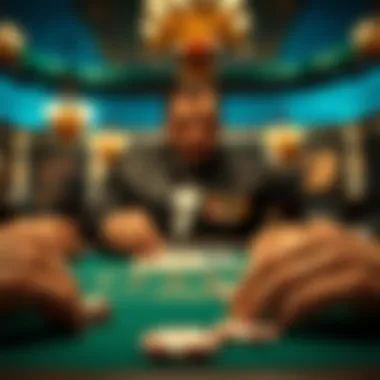
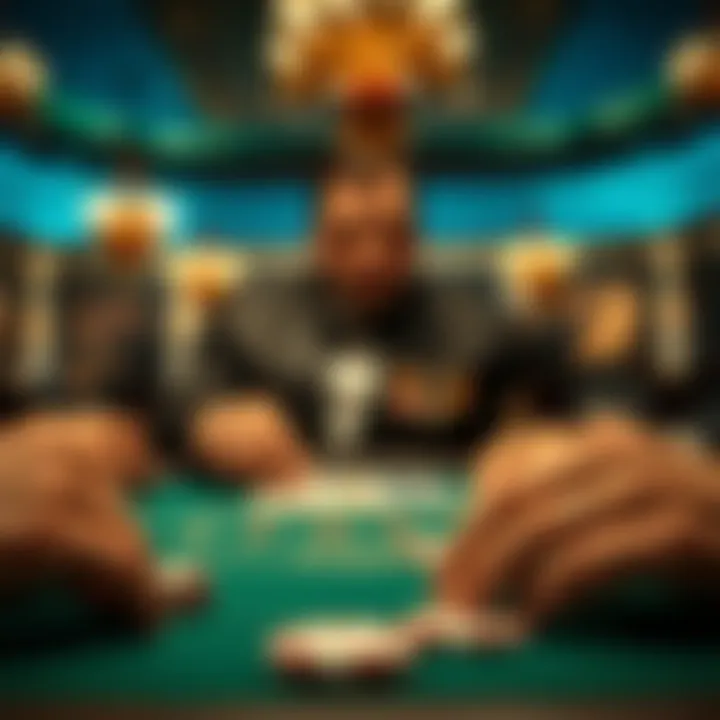
Mastering blackjack isn't just about grasping strategies; it's also about honing your skills through persistent practice. The significance of practical tips can't be understated. These guidelines help players refine their approach, make informed decisions under pressure, and develop a deeper understanding of the game’s dynamics. Emphasizing the importance of practice leads to improvement, allowing you to tackle real-world scenarios with greater confidence.
Ways to Practice Effectively
To truly elevate your game, you need to approach practice with intention. Below are some effective methods:
- Online Simulation: Many websites provide free blackjack games where you can practice without financial risk. These platforms often allow you to set various game conditions to simulate high-stakes situations.
- Mobile Apps: Certain mobile applications are designed specifically for practicing blackjack. They often include tutorials, strategy guides, and even multiplayer options to compete against other players.
- Home Games: Gather friends or fellow enthusiasts for casual game nights. This setting encourages a comfortable learning environment while still offering the thrill of competition.
"It’s not just about playing; it's about playing smart and learning from each deal."
These ways encourage repetition, a key factor in mastering any skill. The more hands you play, the more you understand the flow of the game.
Analyzing Your Game Performance
Reflecting on your gameplay is as crucial as the practice itself. Keeping track of your sessions allows you to identify patterns and adjust accordingly. Here are some techniques:
- Maintain a Game Journal: Document your hands, strategies employed, and outcomes. Over time, this will reveal your strengths and weaknesses.
- Review Mistakes: Focus not just on winning hands but especially on losing ones. Identify what went wrong and consider how you’d make different choices in the future.
- Seek Feedback: If you play with friends, ask for their input on your decision-making. Sometimes an outside perspective can shine a light on areas for improvement that you might overlook.
Regular analysis fosters a mindset of constant improvement. The goal is to view each session as a learning opportunity rather than a mere gamble.
Finding the Right Environment for Learning
The environment you choose to practice can significantly impact your progress. Factors to consider include:
- Noise Level: A distracted mind won’t make for a sharp player. Choose a quiet space or a comfortable online platform to avoid interruptions.
- Seriousness of Play: If you’re just practicing, be wary of high-pressure situations, such as busy casinos. Instead, look for quieter times or private game settings.
- Access to Resources: Surround yourself with books, articles, or even mentors who can provide insights and strategies. This exposure will deepen your understanding of the game’s nuances.
By creating the right atmosphere for practice, you set the stage for effective learning. Whether it’s choosing the right time to play or the best materials to study, every detail matters.
In summary, practical tips for practicing blackjack encompass a variety of methods designed to enhance your game. From structured practice routines to thoughtful performance analysis and conducive environments, each component plays a vital role in shaping a well-rounded player. Remember, the journey to mastering blackjack is an ongoing process, one that benefits immensely from deliberate and focused practice.
Ethical Considerations in Blackjack
In the realm of blackjack, as with any form of gambling, ethical considerations serve as the backbone of a fair and enjoyable gaming environment. It’s paramount for players and casinos alike to navigate these waters with integrity. This section explores why ethics matter in blackjack, touching on the importance of understanding casino rules, maintaining fair play, and recognizing the thin line between strategy and cheating, ultimately enriching the overall gaming experience for everyone involved.
Understanding Casino Rules
Every casino, whether brick-and-mortar or online, operates under a specific set of rules that govern gameplay. Understanding these rules is not just a matter of complying with regulations but also respecting the spirit of the game. Each establishment has the right to enforce its own guidelines, and awareness of these can greatly enhance a player's strategy.
- Here are a few key rules often found in casinos when playing blackjack:
- Table Limits: Casinos set minimum and maximum bets to maintain fairness and ensure a safe betting environment.
- Payout Ratios: Players should know the payout for blackjack, usually 3:2 in most places, but it can vary.
- Dealer Rules: Understanding the specific rules for how dealers must play is crucial; for instance, many dealers must hit on soft 17.
Understanding these aspects prevents confusion and potential conflict at the table, allowing players to focus more on their strategy and less on misunderstandings.
Fair Play and Integrity
In any casino game, fair play is essential. It's about understanding that every player at the table deserves an opportunity to play without the interference of unethical behavior. Fair play builds trust among players and between the players and the casino.
- Practicing integrity in blackjack includes:
- Honesty in Betting: Not trying to manipulate or collude with other players.
- Respecting the Dealer: They are there to facilitate the game, not to be seen as opponents.
- Accountability: Holding oneself accountable for one's actions and decisions during gameplay.
Promoting fairness not only improves the atmosphere at the table but also enhances the natural enjoyment of the game, leading to a better overall experience for all involved.
The Line between Strategy and Cheating
The distinction between effective strategy and cheating can sometimes be blurred. Knowledge of game mechanics and strategic moves, such as card counting, fall within ethically acceptable practices. However, when a player utilizes methods that are disallowed, such as using marked cards or employing outside assistance from electronic devices, they cross into ethically gray territory.
- Here are a few tactics that could be perceived as overstepping:
- Using Devices: Employing gadgets or software that calculate probabilities in real-time.
- Collusion: Working with others at the table to manipulate outcomes.
- Card Marking: Altering the cards to gain insights on the dealer’s hand.
It's crucial for players to reflect on their actions, as crossing this line can lead not only to being banned from the casino but also damage to one’s reputation and future playing opportunities.
Maintaining ethical considerations in blackjack contributes to a better gaming experience for everyone. Knowing the rules, embracing fairness, and understanding the boundaries of strategy versus deceit can elevate a player's engagement with the game.
Ending: Mastering Blackjack Strategy
In any discussion about blackjack, the idea of strategy cannot be underestimated. Mastering blackjack isn’t solely about luck; it fundamentally hinges on understanding the game intricately and applying strategies that maximize opportunities while minimizing risks. Players who take the time to delve into the concepts detailed in this article, from understanding the basic rules to the nuanced psychological aspects, will find themselves better equipped to make decisions at the table.
The beauty of blackjack lies in its balance of unpredictability and skill. With the right approach, players can tip the scales in their favor. This involves not just memorizing charts or counting cards, but also grasping the emotional elements of the game. Those capable of managing their psyche while reading others will have an upper hand.
"Strategy isn’t just play; it’s being able to adapt and react based on what unfolds in front of you."
Considerations like the house edge or the advantages that come from various betting techniques can shape a player’s overall experience and success rate. The journey towards mastery involves consistent learning, practice, and a willingness to evolve.
As players incorporate both mathematical and psychological insights, they gain a clearer picture of their own playing style, paving the way for a more enjoyable and potentially profitable experience.
Summary of Key Takeaways
- Understanding the Game: A solid grasp of the rules and the aim of blackjack sets a strong foundation.
- Core Strategies: Familiarizing oneself with basic strategy tables and situational plays is essential to effectively navigate the game.
- Card Counting: A highly regarded strategy that can shift the odds, but requires practice and discipline.
- Psychological Factors: Recognizing the mindset both within oneself and in opponents can be just as critical as any technical skill.
- Betting Techniques: Various strategies, such as spread betting or the Martingale system, can influence overall results.
- Continuous Education: Blackjack is dynamic; ongoing learning helps in adapting to new scenarios and maintaining an edge.
Each of these points highlights how the game is far more than simply playing cards; it’s a rich tapestry of skills, psychology, and strategic thinking that rewards those who are willing to invest effort into mastering it.
Continuing Your Blackjack Education
Education in blackjack doesn’t stop here. To truly excel and stay ahead, players should seek out additional resources and cultivate a habit of continual learning. Here are several pathways to consider:
- Online Tutorials and Courses: Plenty of sites like YouTube host tutorials from expert players that step through strategies and gameplay.
- Books on Blackjack Strategy: Titles such as Beat the Dealer by Edward O. Thorp or Blackjack Strategy: A Comprehensive Guide can deepen understanding.
- Forums and Community Discussions: Platforms like Reddit can be wealths of information, where players discuss strategies and share experiences.
- Join Local Games or Online Tables: Practical experience is irreplaceable. Whether at a local casino or an online platform, nothing beats real-game exposure.
- Analytical Software: Invest in software designed to analyze gameplay decisions, helping you spot strengths and weaknesses in your strategy.
The art of mastering blackjack is an ongoing endeavor. With each hand that’s played, whether it results in a win or a loss, experience is gained. With dedication to continual education and strategy refinement, players can develop the confidence and competence needed to potentially turn the tables in their favor.







